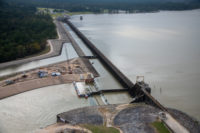A year after completing an ambitious infrastructure development, the Houston Spaceport has found three major anchor tenants and is about to undertake the construction of a new taxiway that will fully integrate its operation with Ellington Airport (EFD).
“Make no mistake about it, the world is on the cusp of an aerospace craze. Innovation and technology will drive Houston’s economy forward, and the aerospace industry will be a key part of that,” Houston Mayor Sylvester Turner said at a groundbreaking event for one of the spaceport’s anchor tenants, Intuitive Machines, on Dec. 2.
The Houston Spaceport is one of 14 FAA-Licensed spaceport sites in the United States and the first located near a major metropolitan area. According to the Houston Airport System (HAS), which owns and manages the spaceport, the mission is to create a focal point for aerospace innovation with a collection of aerospace companies that will lead the U.S. in a transition from a government-driven to a commercially driven space program.
In February 2021, a $21 million Phase I infrastructure project was completed that involved construction of 2.5 miles of streets as well as the development of water, wastewater, electrical power and distribution, fiber optics and communications facilities. The project was handled by a joint venture between Texas Sterling Construction Co. Inc. and Banicki Construction
Since that time, three anchor tenants have begun work on developing facilities at the site: Intuitive Machines and Axiom Space, both based in Houston, as well as Charlotte, N.C.-based Collins Aerospace. The three plan to construct approximately 577,000 sq ft of structures on more than 42 acres of the spaceport property.
Approximately a third of the property allocated for the spaceport – about 150 acres – has now been developed as a shovel-ready site for developers, explains Jimmy Spence, marketing/business development specialist at the spaceport.
“We are at a stopping point for developing the remainder of the property until we identify more tenants,” he says. As new tenants emerge, their specific needs can be integrated into planning the development of additional infrastructure on the site.
The next phase of the Houston Spaceport project will be the construction of a $137 million taxiway that will connect the spaceport facilities to the airport’s runways. Approximately $120 million of the cost is from FAA grants.
The 75-ft-wide, concrete taxiway will run parallel to Ellington Airport’s 4-22 runway, providing access to the entire 450-acre spaceport development.
“It will essentially create an entire new airport on the southeast side of EFD,” Spence says. “This new airside access will be suitable for horizontal launch providers, MROs and commercial aviation.”
HAS is currently accepting bids for the design and construction of Taxiway Lima, which could break ground as early as this summer and be completed next year.
In 2015, HAS received a launch site license from the Federal Aviation Administration, allowing Ellington Airport to serve as a launch site for reusable launch vehicles. Due to its urban location, vertical rocket launches are not possible at the Houston spaceport, but it will be able to support spacecraft that take off or land like planes.
Late last year, the Houston City Council authorized the creation of the Houston Spaceport Development Corp., opening the door to state funding. That eligibility paved the way for a $5 million grant from Texas’ Spaceport Trust Fund that will be directed to the taxiway project.
In a separate effort, the airport completed a new $12.4 million air traffic control tower in 2018, which is designed with expansion space to accommodate future spaceport operations. The 143-ft-tall tower replaces the original tower that was built in 1955 and suffered signification damage from Hurricane Ike in 2008.
Work on the property for the three anchor tenants is ongoing at the site.
Axiom Space, a commercial space station builder, is planning a 322,000-sq-ft headquarters that will be fully operational next year. In January, the firm awarded Dallas-based Jacobs Engineering Group Inc. the architecture and engineering phase one design by for the Assembly, Integration and Testing facility planned for the new campus. When completed, Axiom Space’s 22-acre headquarters campus will be used to train astronauts and build the world's first international private space station.
"For the first time, spacecraft will be built and outfitted right here in Houston, Texas,” says Axiom chief technology officer Matt Ondler. “This facility will provide us with the infrastructure necessary to scale up operations and bring more aerospace jobs to the area.”
Last December, Intuitive Machines broke ground on a $40 million, 125,000 sq-ft operations center that will be completed in spring 2023. Intuitive Designs will use to develop a lunar lander that can deliver commercial cargo and NASA-provided payloads to the moon. The company plans to land a lunar module on the moon this year.
The City of Houston is paying for the construction of the 12.5-acre facility and has a 20-year lease with Intuitive Machines for repayment. Kansas City-based Burns & McDonnell is handling the design and construction of the project. When completed, the center will provide office space for the firm as well as mission control rooms, production areas and a propulsion test facility.
Finally, construction on a 120,000-sq-ft campus for Collins Aerospace is expected to be completed by the end of this year. The subsidiary of Raytheon Technologies Corp. is planning a manufacturing facility on the eight-acre site as well as a dedicated 10,000-sq-ft area for start-ups and universities to collaborate on solving critical space technology challenges, including robotics, medicine and additive manufacturing.







